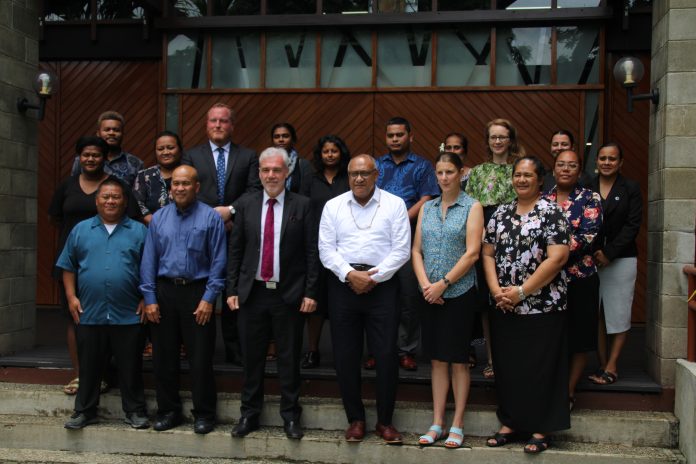The International Atomic Energy Agency (IAEA) updated Pacific nations on its work to review plans by Japan to release over a million tonnes of treated nuclear wastewater into the Pacific Ocean, in the coming months.
The wastewater, treated under a process known as ALPS, comes from storage tanks at the damaged TEPCO Daiichi Nuclear Power Plant in Fukushima from the nuclear disaster following the great earthquake and tsunami event of 11 March 2011.
The IAEA team, led by Director and Coordinator of the Department of Nuclear Safety and Security, Gustavo Caruso, were part of the hybrid session at the Secretariat as part of a two-day visit to Fiji. IAEA presented to Forum Members on its safety standards and its work to review safety related aspects of the wastewater and of the ocean discharge plan.
In his opening remarks, Acting Secretary General of the Pacific Islands Forum, Dr Filimon Manoni, thanked the IAEA for appreciating the magnitude of the issue to Pacific Islands, noting the concurrent High-Level political mission in Japan taking Pacific concerns to the highest level of political leadership.
“The unfortunate accident of March 2011 does remind us of the challenges of nuclear safety and so we constantly strive for higher standards in terms of safety to lives, as well as to the environment and human health”, Acting SG Manoni said. “Many of us in the region do not need to be reminded about the seriousness of the issue. We live with the legacy of nuclear contamination as a result of the post-WW2 nuclear testing programmes, and have the actual lived experience as well as the moral authority to speak on this issue”.
In a frank question and answer session, Pacific officials raised questions and concerns regarding Japan’s ocean release plan, including the adequacy of the data, the safety of the wastewater, its alternative uses, and the need for full transparency and strengthened information sharing between IAEA and PIF in order to address information gaps and help the work of the PIF independent experts reviewing the data.
The IAEA reaffirmed its commitment to ongoing dialogue with Pacific states and experts, and reiterated the importance of science-based, independent, impartial and transparent engagement.
Acting SG Manoni reiterated the need for more meaningful exchanges with the IAEA moving forward in view of the urgency of this issue.
*Created in 1957, the IAEA is the world’s central intergovernmental forum for scientific and technical cooperation in the nuclear field. It works for the safe, secure and peaceful uses of nuclear science and technology. There are currently 9 Pacific Members of the IAEA: Australia, New Zealand, the Republic of the Marshall Islands, Palau, Fiji, Papua New Guinea, Vanuatu, Samoa, and Tonga who recently joined in 2022.
Media Contact: Lisa Williams, Public Affairs Adviser, Pacific Islands Forum, Email: lisaw@forumsec.org
SOURCE: PIFS/PACNEWS














